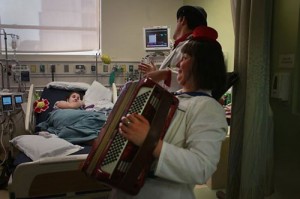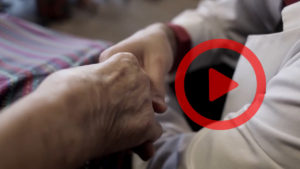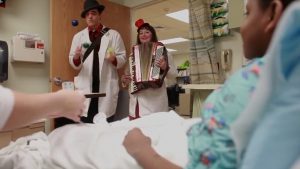Theatrical Intervention and Humor
by Sharon B. Sherman, PhD, Executive Director
 The use of “theatrical intervention and humor” in the care of patients has been documented as early as the 13th century. As health care moves from what was considered the “disease model” toward the more “patient-centered health model”, there is an increase in exploring and researching the positive dimensions of health and their healing properties.
The use of “theatrical intervention and humor” in the care of patients has been documented as early as the 13th century. As health care moves from what was considered the “disease model” toward the more “patient-centered health model”, there is an increase in exploring and researching the positive dimensions of health and their healing properties.
- Studies reveal that theatrical laughter or what we call therapeutic medical clowning significantly decreases the level of anxiety perceived by both children undergoing allergy SPT and their parents, as well as the pain perceived by young children.
- Research indicates that children who had been sexually abused who were accompanied by a medical clown during their physical examination expressed less fear, reported lower pain levels, and had fewer invasive thoughts.
- Humor therapy with children suffering from respiratory pathologies shows promising results. studied children who received group interactions with two medical clowns. This study explored possible positive effects of the presence of a medical clowning on both the clinical evolution of the on-going disease, and on some physiological and pain parameters. When compared with the control group, the children who interacted with the medical clowns showed an earlier disappearance of the pathological symptoms, AND, a statistically significant lowering of diastolic blood pressure, respiratory frequency and temperature for those children.
- Results of a research study conducted on the pregnancy rates of women who were undergoing In-Vitro Fertilization suggest that medical clowning, used as an adjunctive intervention, may have a beneficial effect upon pregnancy outcomes. Thirty-six percent of the women who received therapeutic medical clowning became pregnant compared to 20.2% of the women who did not have the medical clowning intervention. The results are even more impressive since the patients in the intervention group were visited by the clown for only 12-15 minutes.
- A team of researchers at Northwestern University Feinberg School of Medicine in Chicago are collaborating with the Tony Award-winning Lookingglass Theatre Company to test whether unscripted theater games can affect the wellbeing of Alzheimer’s patients early-stage patients. “Improv is all about being in the moment, which for someone with memory loss, that is a very safe place,” says Mary O’Hara, a social worker at the Cognitive Neurology and Alzheimer’s Disease Center at Northwestern University’s Feinberg School of Medicine. “Maybe thinking about the past and trying to remember makes the person a little anxious or even a bit sad because their memory is failing. And maybe thinking about the future too much is also anxiety-provoking. So being in the moment is such a safe and a good place to be.”
- Emily Lu, 26, first saw the effects of art on those with Alzheimer’s as a student at Harvard. It inspired her to create the Harvard Alzheimer’s Buddies for the Arts Program. Now as a medical student at Emory University, she created the Museum Moments Program at the Michael C. Carlos Museum. This program was modeled after a program at New York’s Museum of Modern Art, Meet Me at MoMA, which connects people with mild cognitive impairment and Alzheimer’s to art. “I think art is something that speaks to the human condition, to life and aging and all of those moments in life,” said Lu. “It can make you happy and sad. There are no wrong answers.”
The Medical Clown Project is part of this growing movement for arts organizations, medical professionals and caregivers to use theatrical humor as an integral part of patient care.




